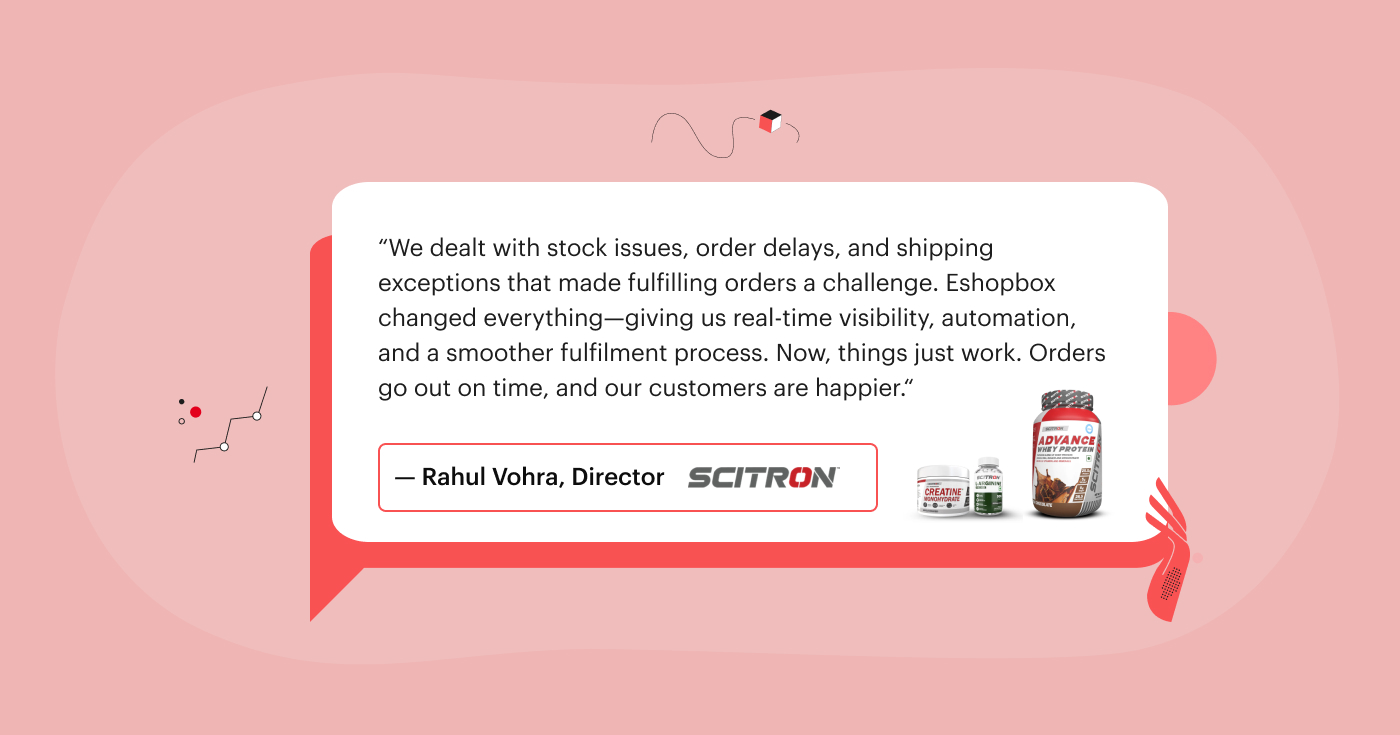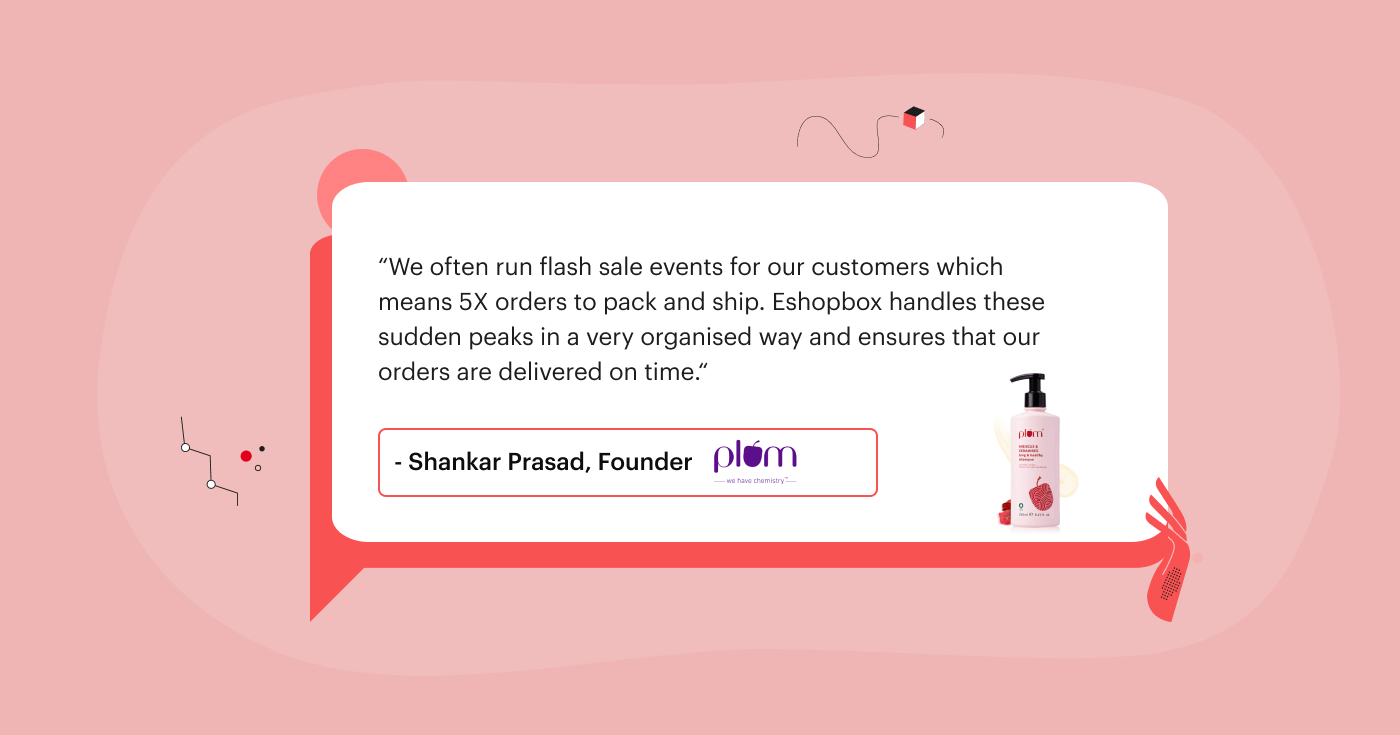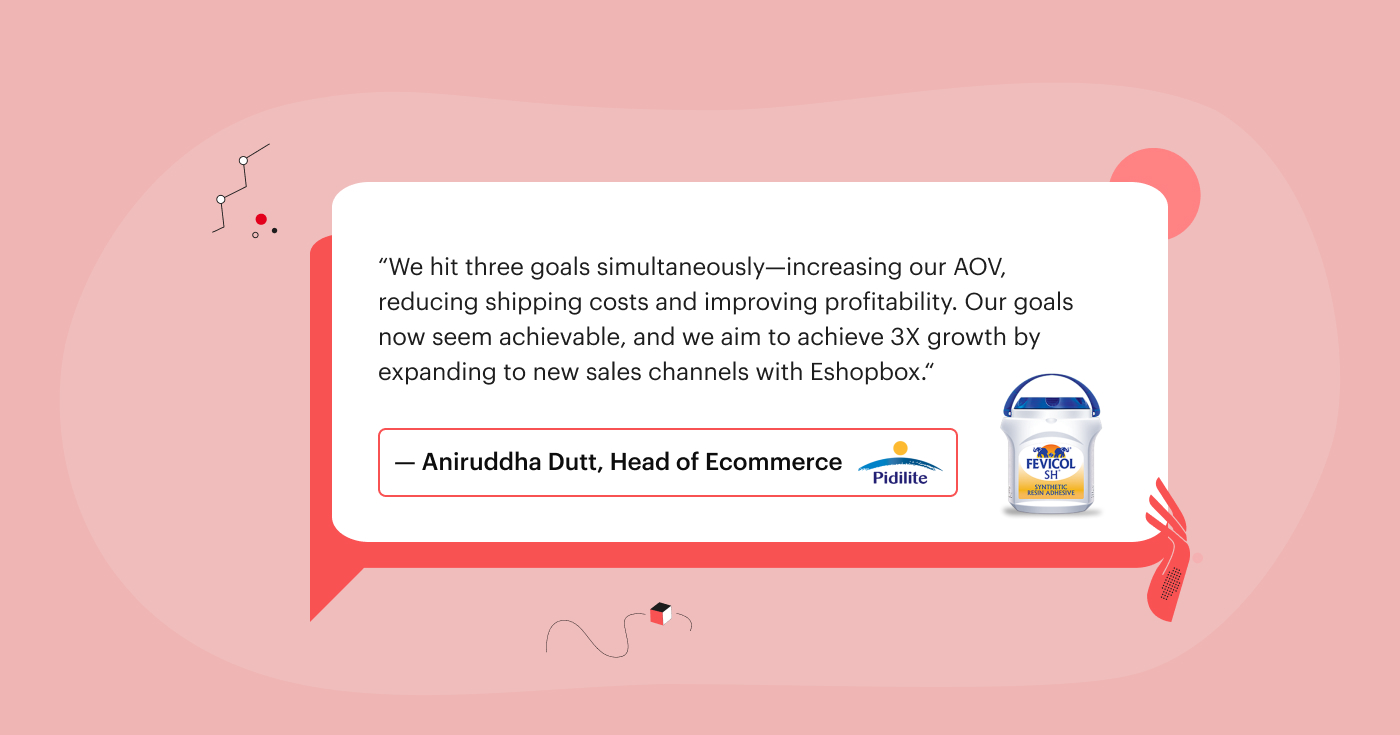
Get the latest from
Eshopbox

The D2C revolution is changing how brands connect with customers. By selling directly, brands can control their pricing, products, and the overall experience — building stronger relationships in the process. But for many D2C founders, the real challenge starts after a customer clicks “Buy Now.” Great marketing and strong products can bring in sales — but fast, reliable fulfillment is what turns first-time buyers into loyal customers.
Every order represents a promise to the customer. If that promise is broken — through delays, damaged products, or poor communication — it costs more than a refund. It costs customer trust.
As brands grow, fulfillment quickly becomes the backbone of the entire operation. Managing orders, warehousing, delivery partners, and returns across multiple channels demands more precision and coordination than ever. At this stage, logistics isn’t just an operational need — it’s a strategic advantage.
Let’s understand what challenges most D2C brands face today, and why fulfillment often becomes the make-or-break factor in their growth journey.
What are the major challenges D2C businesses face?

D2C brands often pour their energy into marketing, product development, and customer engagement — but fulfillment challenges can quietly erode customer trust and slow down growth.
Here are the most common pain points that growing D2C brands face — and why choosing the right ecommerce fulfillment partner or third-party fulfillment solution early can make all the difference.
1. High shipping costs
Customers today expect quick and affordable delivery, but for most D2C brands, meeting that expectation comes at a steep price. Without scale or optimized 3PL logistics, shipping costs add up quickly—cutting into already thin margins.
The problem often begins with fragmented operations. Managing multiple courier partners, warehouses, and packaging processes adds inefficiencies that quietly drain profitability. Over time, what starts as a minor cost difference can become a serious roadblock to growth.
By leveraging a smart fulfillment center service, brands can optimize routes, consolidate shipments, and reduce costs — all while improving delivery speed and consistency.
2. Slow and unreliable delivery experience
For D2C brands, the customer experience doesn’t end at checkout — it continues until the order is in the customer’s hands. A fast, reliable delivery builds trust; a slow or missed delivery does the opposite.
As businesses grow, managing fulfillment from a single warehouse quickly becomes a bottleneck. Shipping to customers across multiple & distant regions leads to slower transit times and inconsistent service.
Using a third-party fulfillment network or fulfillment center service helps brands overcome this. By storing inventory closer to customers, they can speed up deliveries, reduce costs, and create a smoother experience that keeps people coming back.
3. Poor order visibility and tracking
Today’s customers value transparency as much as speed. They expect real-time updates and clear tracking from the moment they place an order until it arrives. When tracking systems are outdated or disconnected, it leads to confusion, more support requests, and lower trust.
For brands, limited visibility across multiple channels — websites, marketplaces, and social platforms — creates blind spots that make fulfillment management more challenging.
A technology-driven ecommerce fulfillment partner with integrated dashboards can solve this by providing real-time order tracking and centralized visibility. It helps brands stay proactive, resolve issues quickly, and deliver a smooth customer experience.
4. Missed, failed, or RTO deliveries
Return-to-origin (RTO) deliveries are one of the most expensive problems for D2C brands. Each failed delivery wastes time, effort, and logistics costs, while also locking up inventory that could have been sold elsewhere.
Delivery failures usually happen because of inaccurate addresses, unresponsive customers, or poor last-mile coordination — issues that can be prevented with the right systems in place.
Using advanced 3PL logistics tools, brands can now reduce RTOs through smarter address validation, courier allocation, and real-time delivery insights. Proactive handling of high-risk orders not only saves money but also improves customer satisfaction.
5. Complicated and expensive returns management
Returns are an unavoidable part of ecommerce. But managing them manually often leads to delays, errors, and high operational costs. Brands that don’t streamline their return workflows end up losing both time and customer trust.
A well-structured third-party fulfillment process can turn returns into a strength. With automated pickups, quality checks, and restocking workflows, brands can recover inventory faster and improve their overall fulfillment efficiency.
Customers remember how easy it was to return an order — and a smooth experience often turns a disappointed buyer into a repeat customer.
6. Poor communication and limited customer visibility
When a delivery is delayed or an issue arises, customers want clear, timely updates. But many D2C brands don’t have the tools or visibility to manage this effectively. With limited insight into courier performance and no automated alerts, customer support teams often find out about delivery problems only after the customer does. That reactive approach hurts satisfaction and erodes trust.
A reliable ecommerce fulfillment partner helps change that. With automated tracking notifications, real-time delivery updates, and faster issue resolution, brands can stay ahead of problems and give customers a transparent, worry-free experience.
That’s why so many D2C businesses are turning to Eshopbox — to strengthen their fulfillment operations and build lasting loyalty.
Industry wins: How Eshopbox is leading the logistics game

Eshopbox has emerged as a trusted partner for fast-growing D2C brands across multiple industries — offering integrated fulfillment center services that handle everything from warehousing and packaging to last-mile delivery and returns.
Let’s look at how Eshopbox empowers different industries to overcome their unique challenges and grow 2x faster than the market average.
1. Fashion & Apparel
Read more about Berrylush ->
Key fulfillment challenges in the fashion & apparel industry
- Managing complex omnichannel operations across D2C websites and multiple marketplaces.
- Handling a high volume of returns while maintaining operational efficiency.
- Keeping pace with fast-changing fashion trends and fluctuating demand.
How Eshopbox helped
Berrylush simplified omnichannel operations by centralizing inventory and return data across all sales channels with Eshopbox. This provided real-time visibility into stock levels and order statuses, ensuring accurate listings, timely fulfillment, and reduced stockouts — no matter where customers shopped.
To address the high volume of returns, Eshopbox implemented automated return workflows that streamlined every step, from quality checks and restocking. This enabled Berrylush to quickly process returns, recover maximum value, and even detect fraudulent activities through CCTV-enabled fulfilment centres.
Finally, Eshopbox’s data-driven insights empowered Berrylush to stay agile amid changing trends. By analysing return patterns, identifying high-return SKUs, and understanding customer pain points such as sizing issues, the brand could make informed decisions to improve product accuracy and reduce future returns.
Result: With smoother operations, faster turnarounds, and actionable insights, Berrylush elevated both its customer experience and operational profitability.

2. Health nutrition & FMCG
Read more about Scitron ->
Key fulfillment challenges in the health, nutrition & FMCG industry
- Fluctuating demand that makes accurate forecasting and inventory planning difficult.
- High logistics and fulfillment costs cutting into profitability.
- Supply chain disruptions that cause delivery delays and inventory imbalances.
How Eshopbox helped
Eshopbox helped Scitron gain complete control over its operations with a centralized inventory management system, providing real-time visibility across all sales channels. With automated stock updates, batch-wise cycle counting, and accurate tracking, Scitron could efficiently manage inventory levels, reduce discrepancies, and ensure the right products were always available to meet demand.
To combat high operational costs and inefficiencies, Eshopbox enabled efficient order fulfillment through optimized warehousing, barcode-based picking, and strict SLA adherence. These improvements minimized manual errors, streamlined order processing, and ensured timely and accurate deliveries — improving customer satisfaction while keeping costs under control.
Finally, Eshopbox’s streamlined shipping and intelligent order routing strengthened Scitron’s supply chain resilience. By leveraging data to identify and hold high-risk orders, resolve delivery issues faster, and eliminate weight discrepancies, Scitron achieved reduced RTOs, faster deliveries, and more reliable last-mile execution even during market fluctuations.
Result: With smarter inventory control, optimized fulfillment, and faster deliveries, Scitron enhanced efficiency, reduced costs, and built a stronger, more resilient supply chain.

3. Beauty & Wellness
Read more about Pureplay ->
Key fulfillment challenges in the beauty & wellness industry
- Managing temperature-sensitive and fragile beauty products while ensuring quality preservation.
- Maintaining accurate expiry tracking and preventing outdated stock from reaching customers.
- Handling high-order volumes during peak sales without compromising delivery speed or brand experience.
How Eshopbox helped
Eshopbox designed a customized fulfillment solution for Pureplay that combined precision, flexibility, and scalability. Products were stored individually and assembled into kits only after an order was placed, ensuring freshness and eliminating the risk of expired items being shipped. Batch-level tracking and automated expiry management gave Pureplay full control over product shelf life and compliance.
To address the need for premium presentation and brand consistency, Eshopbox implemented tech-enabled packaging workflows that allowed Pureplay to apply custom packaging rules and include marketing inserts within shipments — delivering a consistent and engaging unboxing experience for every customer.
Finally, Eshopbox’s scalable fulfillment infrastructure ensured smooth operations even during major sale events, when order volumes spiked up to 5X. With a flexible pay-as-you-go model for storage and dispatch, Pureplay could optimize costs while maintaining reliable, on-time deliveries nationwide.
Result: With improved expiry control, elevated customer experience, and seamless scalability during high-demand periods, Pureplay strengthened its brand reputation while keeping operations cost-efficient and agile.

4. Homecare & Essentials
Read more Pidilite ->
Key fulfillment challenges in the homecare & everyday essentials industry
- Ensuring reliable and timely last-mile delivery across diverse regions in India.
- Maintaining strict regulatory compliance and operational consistency across marketplaces.
- Achieving accurate demand forecasting and real-time data visibility to reduce stockouts and cancellations.
How Eshopbox helped
Eshopbox enabled Pidilite to achieve superior marketplace fulfillment performance through a combination of automation, distributed infrastructure, and intelligent analytics. With ultra-fast and accurate order processing, every order — even during holidays — was dispatched on time, helping Pidilite consistently meet marketplace SLAs and qualify as a top-tier seller.
To enhance reliability and reduce cancellations, Eshopbox implemented real-time inventory synchronization across all sales channels. This eliminated overselling and ensured accurate stock visibility, allowing Pidilite to maintain an exceptionally low cancellation rate while optimizing marketplace performance.
Eshopbox also strengthened Pidilite’s supply chain resilience by strategically distributing inventory across a nationwide network of fulfillment centers. This improved regional utilization and in-stock rates, enabling faster, cost-efficient deliveries through local and zonal shipping — a key advantage in the competitive homecare segment.
Result: With faster deliveries, reduced cancellations, and full data visibility, Pidilite improved its fulfillment efficiency, marketplace ranking, and customer satisfaction across India.

The fulfillment edge: From operational efficiency to brand growth
Working with the right ecommerce fulfillment partner goes beyond operational convenience. It’s about enabling long-term growth.
Here’s how Eshopbox creates measurable impact for D2C brands:
- Faster delivery speeds: Deliver 1–2 days faster with regional inventory placement.
- Reduced logistics costs: Optimize routes and carriers using AI-driven recommendations.
- Improved customer experience: Enable reliable tracking and proactive notifications.
- Higher retention: Enhance customer satisfaction with timely, damage-free deliveries.
- Lower RTOs: Smart delivery allocation and better address verification reduce failed deliveries.
With these advantages, Eshopbox-powered D2C brands are growing 2x faster than the market, outperforming peers who still manage fulfillment manually or through fragmented partners.
Conclusion
For D2C brands, logistics is no longer a back-end function — it’s a growth engine. Choosing the right ecommerce fulfillment partner determines how fast and efficiently your brand can scale.
Eshopbox combines advanced technology, nationwide infrastructure, and deep industry expertise to simplify logistics for every D2C category — from fashion and beauty to FMCG and homecare.
As customer expectations rise and competition intensifies, brands need fulfillment that’s fast, flexible, and future-ready. With Eshopbox’s fulfillment center services and third-party fulfillment solutions, D2C sellers can focus on what they do best — building great products and experiences — while Eshopbox ensures every delivery exceeds expectations.
Connect with our fulfilment expert today.
Talk to salesRelated Articles
Top 10 popular D2C apparel brands in India in 2026
The 2026 ultimate guide to D2C fulfilment in India
How Eshopbox Helps Brands Deliver Faster with a Pan-India Warehouse Network?













